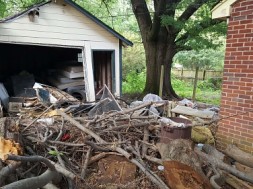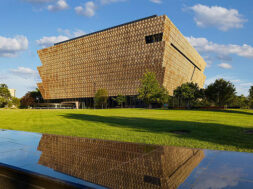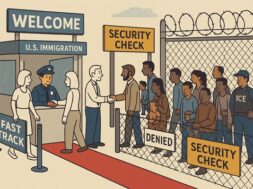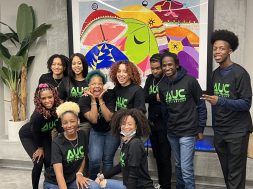
Bank of America Accused of Racial Discrimination in 30 U.S. Metropolitan Areas and 201 Cities
Washington, DC – The National Fair Housing Alliance (NFHA) and nine local fair housing organizations recently filed an amended discrimination complaint against Bank of America (BoA). The complaint alleges illegal discrimination by BoA in African American and Latino neighborhoods in six additional cities. This new evidence of discriminatory treatment by BoA will be added to the federal Fair Housing Act complaint on file with the U.S. Department of Housing and Urban Development. Furthermore, NFHA and the nine fair housing organizations added new evidence to their existing claims. The six additional cities are: Columbus, OH; Gary, IN; Minneapolis, MN; Newark, NJ; Tampa, FL; and neighborhoods in suburban Detroit.
NFHA and the nine fair housing organizations investigated an additional 399 Bank of America foreclosures and found that BoA continues its failure to properly maintain foreclosed properties in African American and Latino neighborhoods. This new evidence formed the basis of the amended complaint. The complaint is now comprised of evidence from 1,267 BoA properties in 30 metropolitan areas and 201 cities throughout the United States.
“Bank of America’s deliberate neglect of its foreclosures in communities of color creates financial concerns as well as health and safety risks for people living near poorly-maintained foreclosed homes,” said Shanna L. Smith, President and CEO of NFHA. “Too many of these foreclosures have overgrown weeds, unsecured doors or windows, and debris left in the yard, creating perfect breeding grounds for rats, mice, snakes, and mosquitoes. Bank of America is exacerbating the risk of spreading the Zika virus in south Florida by allowing standing water to accumulate in pool covers, tires, and debris around these foreclosures.”
Fair housing organizations joining the National Fair Housing Alliance in amending the complaint are located in the following areas: Atlanta, GA; Dallas, TX; Metropolitan Chicago, IL; Milwaukee, WI; Orlando, FL; and Toledo, OH. The National Fair Housing Alliance investigated the foreclosures in Memphis, TN, Baltimore, MD; Philadelphia, PA and Prince George’s County, MD.
Evidence obtained during this investigation reveals continued failure by Bank of America to perform simple, routine maintenance on its foreclosures in African American and Latino neighborhoods. BoA routinely fails to lock or secure doors and windows, remove trash and debris left by former owners, mow and edge lawns, trim shrubs, and cut back invasive plants. Meanwhile, BoA keeps its foreclosures in white neighborhoods in good condition. Lawns are mowed and edged regularly, and BoA properly disposes of the belongings left behind by former owners. BoA is paid to perform these routine duties in all neighborhoods for all of its foreclosures.
“This disgraceful neglect of foreclosed homes in communities of color is not news to executives at Bank of America. We put them on notice in 2009 and met with them to share photographs of the failed maintenance, but to no avail. It is reprehensible for Bank of America to continue discriminating in African American and Latino neighborhoods all across the U.S.,” said Smith.
The Fair Housing Act makes it illegal to discriminate based on race, color, national origin, religion, sex, disability, or familial status. It is also illegal to discriminate based on the race or national origin of neighborhood residents. This law applies to housing and housing-related activities, including the maintenance, appraisal, listing, marketing, and selling of homes.
NATIONWIDE STATISTICS
Full national statistics, maps, and data for individual cities available at www.nationalfairhousing.org.
The nationwide investigation of BoA foreclosures to date has encompassed 30 metropolitan areas and included 201 cities (see Table 1). Zip codes within each city were identified based on homeownership rates, income, and racial composition. Each BoA foreclosure in those zip codes was examined. The properties were located in predominantly African American or Latino neighborhoods in 85 cities and in predominantly white neighborhoods in 116 cities.
The National Fair Housing Alliance and 17 fair housing organization partners have investigated a total of 1,267 Bank of America foreclosures. The data set includes 567 foreclosures located in African American neighborhoods, 130 foreclosures located in Latino neighborhoods, 147 foreclosures located in majority non-white neighborhoods, and 423 foreclosures located in white neighborhoods.
Highlights of Significant Racial Disparities:
51.5 percent of foreclosures in communities of color had a broken, boarded, or unsecured window, while only 23.4 percent of foreclosures in white communities had the same problem.
63.3 percent of foreclosures in communities of color had trash or debris on the premises, while only 33.8 percent of foreclosures in white communities had the same problem.
30.1 percent of foreclosures in communities of color had holes in the structure of the home, while only 12.8 percent of foreclosures in white communities had the same problem.
38.2 percent of foreclosures in communities of color had unsecured, broken, or boarded doors, while only 14.9 percent of foreclosures in white communities had the same problem.
Baltimore, Charleston, Kansas City, Las Vegas, Memphis, Minneapolis, Oakland, Philadelphia, Phoenix, San Diego, Tucson, Washington DC, Prince George’s County (MD), Tampa, Newark, Suburban Detroit
Founded in 1988, the National Fair Housing Alliance is a consortium of more than 220 private, nonprofit fair housing organizations, state and local civil rights agencies, and individuals from throughout the United States. Headquartered in Washington, D.C., the National Fair Housing Alliance, through comprehensive education, advocacy, and enforcement programs, provides equal access to apartments, houses, mortgage loans, and insurance policies for all residents in the nation.
The work that provided the basis for this investigation was supported in part by funding under a grant from the U.S. Department of Housing and Urban Development. The substance and findings of the work are dedicated to the public. The author and publisher are solely responsible for the accuracy of the statements and interpretations contained in this release. Such interpretations do not necessarily reflect the views of the Federal Government.









